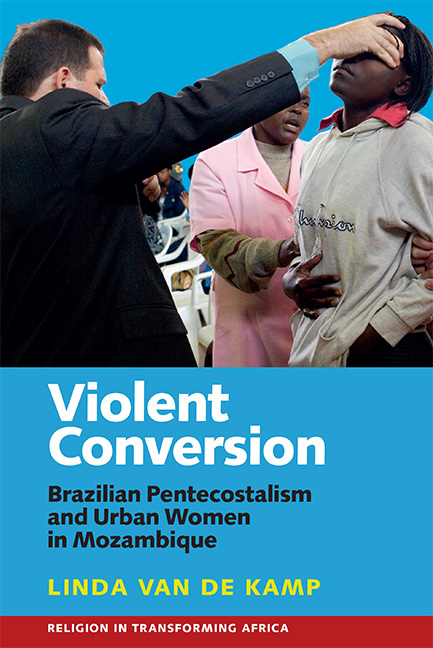Book contents
- Frontmatter
- Contents
- List of Illustrations
- Acknowledgements
- Introduction
- 1 Gender, Family and Social Transformations in Maputo
- 2 Transnational Spaces of Conquest
- 3 Moving Frontiers: the Generational Trajectories of Pentecostal Women
- 4 Converting the Spirit Spouse
- 5 Terapia Do Amor: Confrontational Public Love
- 6 ‘Holy Bonfires’ and Campaigns
- Conclusion: Violent Conversion
- Bibliography
- Index
3 - Moving Frontiers: the Generational Trajectories of Pentecostal Women
Published online by Cambridge University Press: 24 October 2017
- Frontmatter
- Contents
- List of Illustrations
- Acknowledgements
- Introduction
- 1 Gender, Family and Social Transformations in Maputo
- 2 Transnational Spaces of Conquest
- 3 Moving Frontiers: the Generational Trajectories of Pentecostal Women
- 4 Converting the Spirit Spouse
- 5 Terapia Do Amor: Confrontational Public Love
- 6 ‘Holy Bonfires’ and Campaigns
- Conclusion: Violent Conversion
- Bibliography
- Index
Summary
The previous chapters have offered a macro social narrative of the formation of the Mozambican nation-state and a framework for understanding Brazilian Pentecostalism in Mozambique as a critical transnational space regarding gender, reproductive issues and the urban. This chapter describes micro stories in this larger setting, focusing on Pentecostal women, and presents the similarities and differences in the life trajectories of the women I encountered in Maputo while on fieldwork. These plural trajectories of urban Pentecostal women need to be taken into account when analysing how their violent experiences of conversion, which will be examined in the following chapters, are shaped by historical social transformations, personal backgrounds and Brazilian Pentecostalism.
The Pentecostal women I met ranged in age from 15 to 75. The women of varying ages were all preoccupied with issues related to gender roles, marriage, sexuality and family relations, but their particular positions, views and questions on these matters differed. In general, these differences correlated with their age and the specific historical periods in which they grew up.
Pentecostalism in Africa generally seems to attract the younger generations (Gusman 2009; Lindhardt 2010; Trudell et al. 2002; van Dijk 1992), who perceive the particularities of the Pentecostal discourse as very powerful. Pentecostal conversion demands a break with the bonds of kinship and tradition, and presents an opportunity to transform one's life and reduce the influence of others through the power of the Holy Spirit. Van Dijk (1992, 1999) shows how this Pentecostal message empowers youth to define the traditional powerful role of elders as being imbued with evil forces and to no longer obey them. Pentecostal leaders also explicitly target youth through the use of modern styles of worship, dress, language and teachings about relationships and sexuality (Bochow 2010; Frahm-Arp 2010). Young people are generally open to appropriate innovative discourses and technologies (for Africa, see Abbink 2005), and Brazilian Pentecostalism in Mozambique is still considered original and new, unlike the older churches that are seen as being interwoven with the elders and traditions. However, as the life stories described in this chapter demonstrate, the new opportunities youngsters are taking and creating together with the Pentecostal ‘ideology of youth’ (van Dijk et al. 2011) can also be attractive for older persons.
- Type
- Chapter
- Information
- Violent ConversionBrazilian Pentecostalism and Urban Women in Mozambique, pp. 79 - 102Publisher: Boydell & BrewerPrint publication year: 2016



